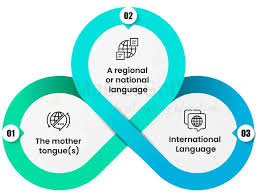
Multi-Lingual Education As A Tool For Societal Cohesion
Literacy which is the ability to write and effectively communicate through written and printed materials, as well as ability to read and comprehend or decode symbols, is the bedrock of human and societal development.
It opens doors to a plethora of knowledge, imagination, innovation, mental health, and other countless opportunities needed for self-actualization.
Since UNESCO’s declaration of International literacy day in 26th October, 1966, a day has been set aside yearly to remind policymakers, individuals, communities and societies the critical role of literacy as a fundamental human right and a tool for creating a more just, peaceful and sustainable society.
This has accordingly helped to improve the global literacy rate from 67 percent in 1976 to 87 per cent in 2022.
Nevertheless, UNESCO positioned that one out of seven adults, aged 15 and above especially women, lack basic literacy skills thereby posing a challenge to meeting the SDG target of 4.6 which is to ensure that all youths and most adults achieve basic literacy and numeracy by 2030.
There is no doubt that Africa has a high representation in this number since statistics provides that in 2022 the literacy level in the African continent was 67.4 per cent, while other continents including Europe, Asia and the Oceania have attained 98.7, 88.4 and 95.8 percent literacy respectively as well as North and South America which literacy rate stands at 98.7 and at 94.7 percent respectively.
In Nigeria, there is indication that the literacy rate stands at 62 percent in 2018.
While 62 per cent is above average, attaining a higher rate is possible and should be a common desire.
Nigeria may draw from other countries such as Croatia, Ireland, Seychelles, Mauritius, and Namibia which have attained above 90% literacy level.
It is worthy of note that literacy transcends the ability to read and write in English language or other western languages but the ability to decode symbols in any language, in other words, multilingualism.
By way of encouraging multilingualism, UNESCO dedicated 2022 to 2032 as the International Decade of Indigenous Languages with the call for commitment to preserve, revitalize, promote and sustain indigenous languages thereby averting their extinction, and provide opportunity for non-native speakers to be literate in languages other than theirs.
No wonder, commemorating the International Literacy Day this year is centred on the theme; promoting multilingual education: Literacy for mutual understanding and peace.
This theme emphasizes the need to develop policies that enhance multilingual literacy skills and provide necessary support for the attainment of that purpose.
In Nigeria, out of the estimated 470 spoken languages, only about 10 percent are used as language of instruction in primary and secondary schools.
Despite Government’s policy on the use of the language of the immediate community for basic education towards advancement of multilingual education, it is doubtful if any strategy is put in place to promote this policy.
This year’s theme therefore challenges everyone to see multilingual education as a vital tool in the efforts to build a more peaceful world. In a world often divided by differences, multilingual literacy becomes imperative for promoting mutual understanding and peace as well as transforming education for Nigeria’s sustainable development.
Multilingualism will enhance communication and interaction between different ethnic groups in Nigeria, promote national unity and harmony.
A Policy should therefore be put in place to support the production of literary materials in indigenous languages, capacity building of basic school teachers on indigenous languages’ use, research and development in the advancement of indigenous languages, as well as promotion of all round continuing education and establishment of reading clubs in indigenous languages in schools and libraries in order to accelerate adoption and deepening of multilingualism among citizen.
By Prof. Chinwe Veronica Anunobi, Edited By Grace Namiji



Commentary
Multi-Lingual Education As A Tool For Societal Cohesion
todaySeptember 14, 2024 3
Multi-Lingual Education As A Tool For Societal Cohesion
Literacy which is the ability to write and effectively communicate through written and printed materials, as well as ability to read and comprehend or decode symbols, is the bedrock of human and societal development.
It opens doors to a plethora of knowledge, imagination, innovation, mental health, and other countless opportunities needed for self-actualization.
Since UNESCO’s declaration of International literacy day in 26th October, 1966, a day has been set aside yearly to remind policymakers, individuals, communities and societies the critical role of literacy as a fundamental human right and a tool for creating a more just, peaceful and sustainable society.
This has accordingly helped to improve the global literacy rate from 67 percent in 1976 to 87 per cent in 2022.
Nevertheless, UNESCO positioned that one out of seven adults, aged 15 and above especially women, lack basic literacy skills thereby posing a challenge to meeting the SDG target of 4.6 which is to ensure that all youths and most adults achieve basic literacy and numeracy by 2030.
There is no doubt that Africa has a high representation in this number since statistics provides that in 2022 the literacy level in the African continent was 67.4 per cent, while other continents including Europe, Asia and the Oceania have attained 98.7, 88.4 and 95.8 percent literacy respectively as well as North and South America which literacy rate stands at 98.7 and at 94.7 percent respectively.
In Nigeria, there is indication that the literacy rate stands at 62 percent in 2018.
While 62 per cent is above average, attaining a higher rate is possible and should be a common desire.
Nigeria may draw from other countries such as Croatia, Ireland, Seychelles, Mauritius, and Namibia which have attained above 90% literacy level.
It is worthy of note that literacy transcends the ability to read and write in English language or other western languages but the ability to decode symbols in any language, in other words, multilingualism.
By way of encouraging multilingualism, UNESCO dedicated 2022 to 2032 as the International Decade of Indigenous Languages with the call for commitment to preserve, revitalize, promote and sustain indigenous languages thereby averting their extinction, and provide opportunity for non-native speakers to be literate in languages other than theirs.
No wonder, commemorating the International Literacy Day this year is centred on the theme; promoting multilingual education: Literacy for mutual understanding and peace.
This theme emphasizes the need to develop policies that enhance multilingual literacy skills and provide necessary support for the attainment of that purpose.
In Nigeria, out of the estimated 470 spoken languages, only about 10 percent are used as language of instruction in primary and secondary schools.
Despite Government’s policy on the use of the language of the immediate community for basic education towards advancement of multilingual education, it is doubtful if any strategy is put in place to promote this policy.
This year’s theme therefore challenges everyone to see multilingual education as a vital tool in the efforts to build a more peaceful world. In a world often divided by differences, multilingual literacy becomes imperative for promoting mutual understanding and peace as well as transforming education for Nigeria’s sustainable development.
Multilingualism will enhance communication and interaction between different ethnic groups in Nigeria, promote national unity and harmony.
A Policy should therefore be put in place to support the production of literary materials in indigenous languages, capacity building of basic school teachers on indigenous languages’ use, research and development in the advancement of indigenous languages, as well as promotion of all round continuing education and establishment of reading clubs in indigenous languages in schools and libraries in order to accelerate adoption and deepening of multilingualism among citizen.
By Prof. Chinwe Veronica Anunobi, Edited By Grace Namiji
Written by: Salihu Tejumola
Multi-Lingual Education As A Tool For Societal Cohesion
Similar posts
Commentary
Need To Intensify Vector Control Services In Nig
todayOctober 11, 2024 16
Commentary
Safeguarding Critical National Assets For Sustainable Devt
todayOctober 10, 2024 17
Post comments (0)
Recent Posts
Recent Comments
Kapital Kruise
3:00 pm - 8:00 pm
Kapital Kruise
With Oyinye Agiriga
Unwind and Energize: Join us on an Electrifying Journey as Kapital FM 92.9 Abuja Presents the After-Work Extravaganza! Tune in from 3PM to 9PM and Let the Vibrant Rhythms Ignite Your Spirit. Welcome to the twilight hours...
closeTop popular
How Wike Transformed Abuja In 1year
CG VGN Congratulates New Service Chiefs, IG, NSA
Stainless Steel Juicer – Making Juicing Fun And Easy
Uzoka-Anite Assumes Duty As Minister Of Industry, Trade and Investment
Stainless Steel Juicer – Making Juicing Fun And Easy
Chart
1
Sunshine
Tommy Blues
Sunshine Tommy Blues
2
Red
Frank Lee
Red Frank Lee
3
Eclipse
Donna May
Eclipse Donna May
Full tracklist